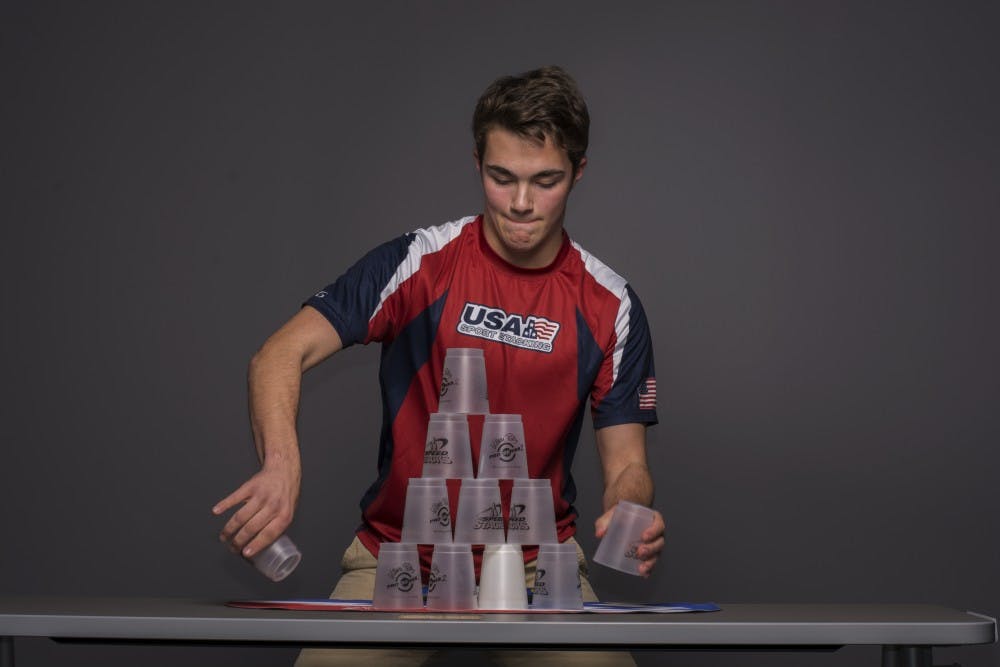Robert Weatherington stepped off his plane in Munich, Germany, into a bustling airport filled with people paying no mind to the young, whistling American.
Amidst the crowd, however, were a handful of familiar faces.
"When I got off the plane, a couple of my friends that lived in Germany were already there. Not to greet me, it was just an accident," Weatherington said. "Straight off the bat I was with my friends and we were stacking on the tables in the airport."
The Ball State freshman was in Speichersdorf, Germany, for the World Sport Stacking Championships April 2 and 3.
"I started in fifth-grade gym class, I just never stopped," he said.
The goal was to stack the plastic cups in pyramids of different sizes as fast as possible. Weatherington, however, carried it with him beyond his class period.
"I did sports in high school but I was always like really short and scrawny, and that was the first time that I was actually better than other people at something. I just kept going with it," he said.
His choice was surprising, given the lack of attention sport stacking receives. Even his family was caught off guard.
"I had never even seen it before he started doing it," said Wade Weatherington, Robert's father.
Robert is part of a relay team, one of five events officially recognized by the World Sport Stack Association. They include the 3-3-3 pyramid, the 3-6-3 pyramid, the cycle, doubles and the relay.
Story continues after this video.
He competed in his first tournament in seventh grade, and during his freshman year of high school Robert attended Nationals in Maryland as one of the top four stackers in Ohio. The venue was filled with the sound of plastic cups rapidly slapping together, with an occasional faint whistle coming from Robert.
"For some reason I was one of the four from Ohio and then Ohio was doing really well," he said. "So it was down to like two states, and I was the only one not on the national team and then Ohio won and they were like 'Hey, this kid's all right, I guess.'"
He was extended an offer to join Team USA afterward, and his relay team still holds a pair of 16U records. But Robert doesn't stack to chase records — he just wants to keep competing.
"I have a lot of friends now that are into it, and we've been to competitions, and the only way I get to see them, because they're all around the world, is at these competitions," Robert said. "So I have to do good to keep up and keep qualifying so I can see my friends. If I didn't make friends I would've burnt out by freshman year."
Robert keeps in contact with his international friends through video chat and social media, but they all look forward to the day they can once again see each other in person.
"These few days a year are the most amazing ones," said Vroni Doser, a German native and a close friend of Robert. "We are always looking forward to them and it is really hard to say goodbye without knowing when you will see each other again. Even if we only have so little time, we enjoy every minute of it and it's like we've known [each other] forever."
Cup stacking is also therapeutic for Robert.
He has Tourette's Syndrome, a neurological disorder recognizable by vocal and motor tics that can be anything from simple muscle movements to vocal outbursts — or occasional whistling.
Robert was diagnosed in eighth grade and made a YouTube video explaining his life with Tourette's. Cup stacking, along with several other hobbies, helps him control his tics by giving him something to focus on.
"By doing those things in a meditative way, it has helped him with his Tourette's," Wade said. "There seems to be something about letting yourself go really fast, but movement with purpose ... something about getting your brain that free that is therapeutic."
Outside of sport stacking, Robert can also solve a standard Rubik's Cube in less than 20 seconds and has taught himself to play both guitar and piano. He also sings and dances.
"I don't tic when I do a Rubik's Cube, I don't tic when I dance, I don't tic when I sing, I don't tic when I play an instrument, I don't tic when I run, and no one knows why," he says in his YouTube video. "Whenever I'm having a bad tic day, it's OK. Because I know as long as I'm bettering myself in one of these specific hobbies, then my tics will stop."
Robert eventually wants to use his experiences to help others like him, Wade said. He wants to use some of the repetitive hand motions and activities to help people by doing them in a non-traditional, but mindful, way.
Even in a stressful, loud atmosphere like the World Championship in Germany, Robert won't tic. He has found his peace in doing something he loves, and he pushes others to do the same.
"Don't let others define you by what's on the outside," he said. "Define yourself by what's on the inside."





